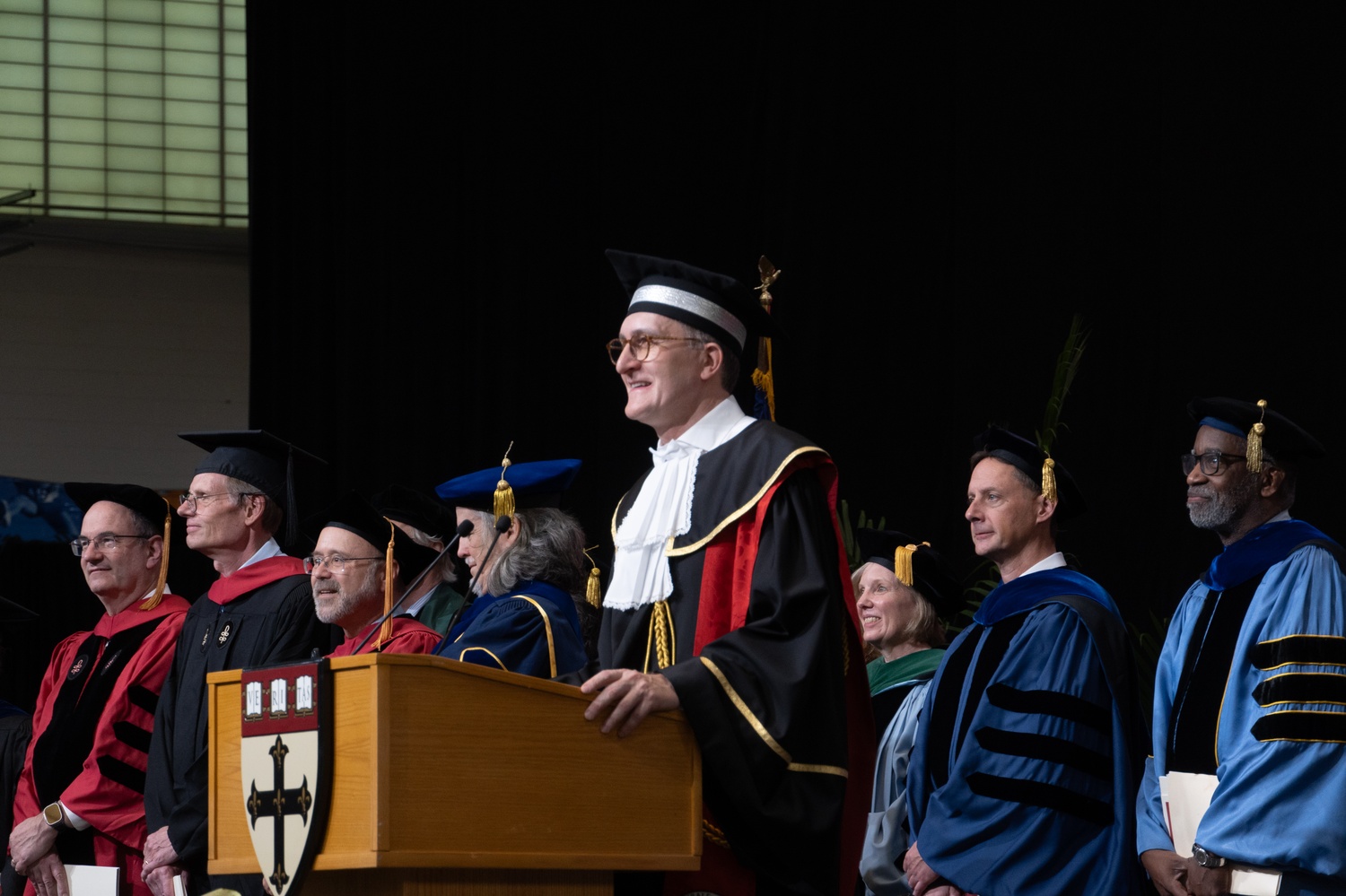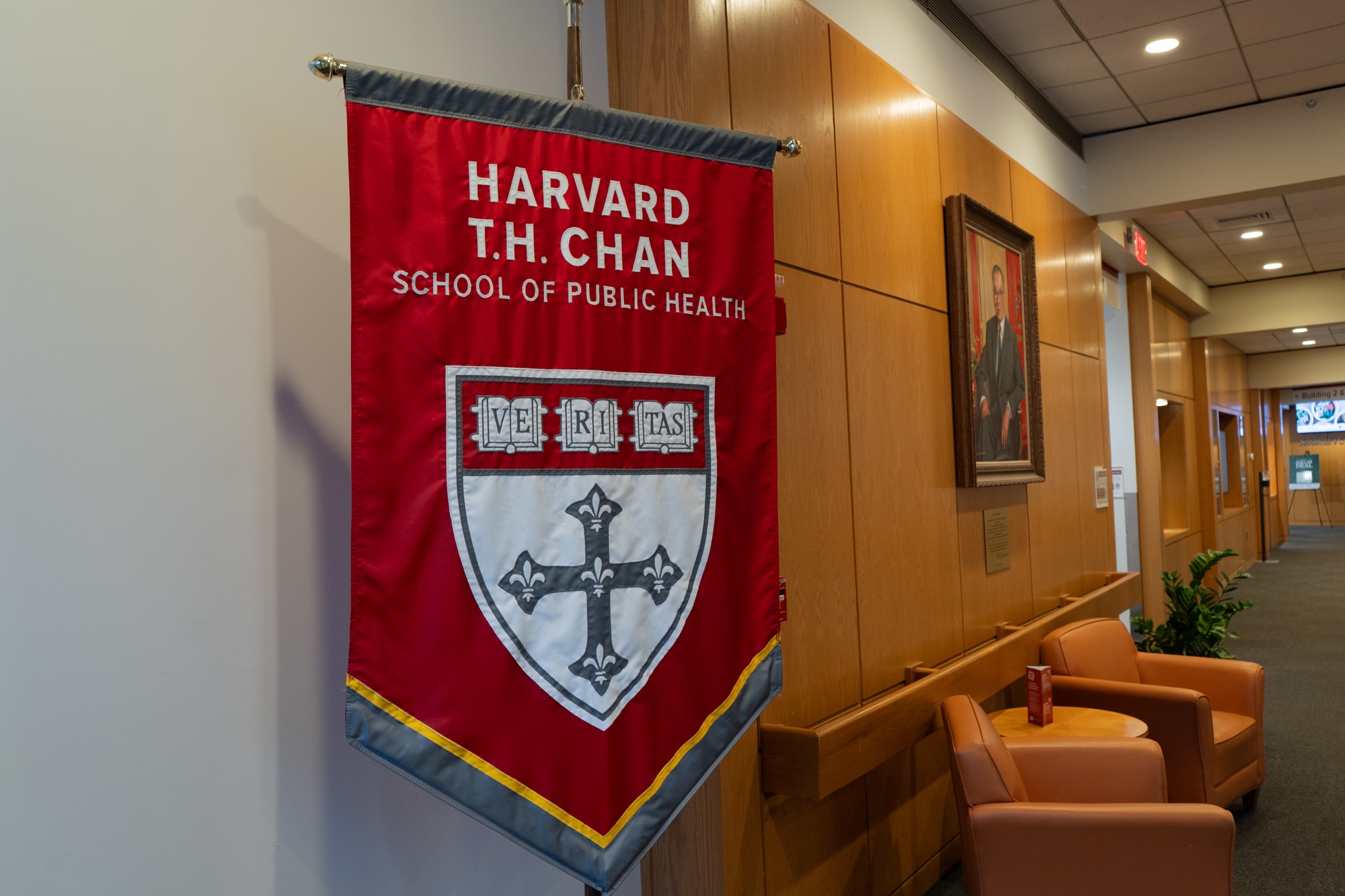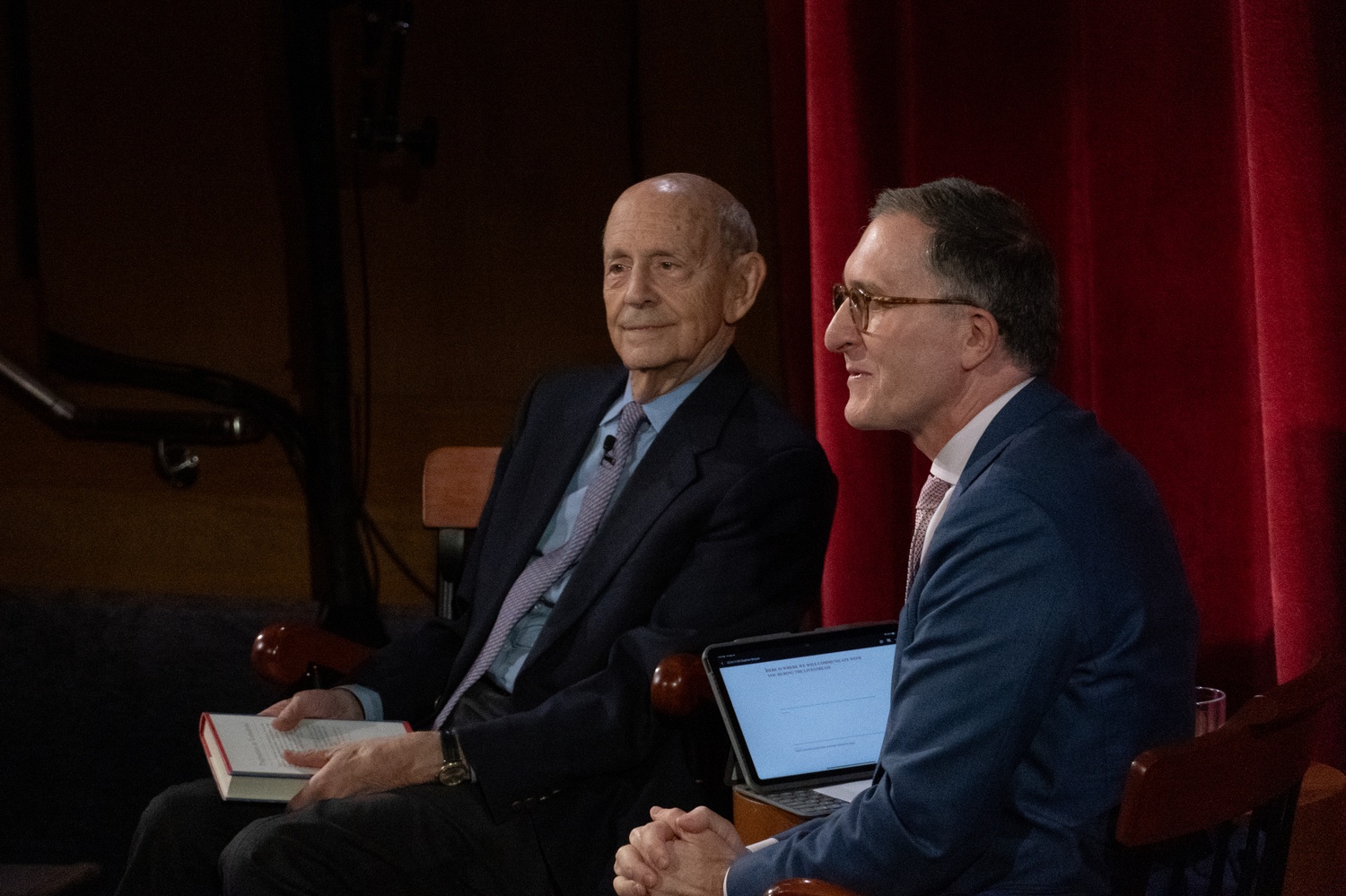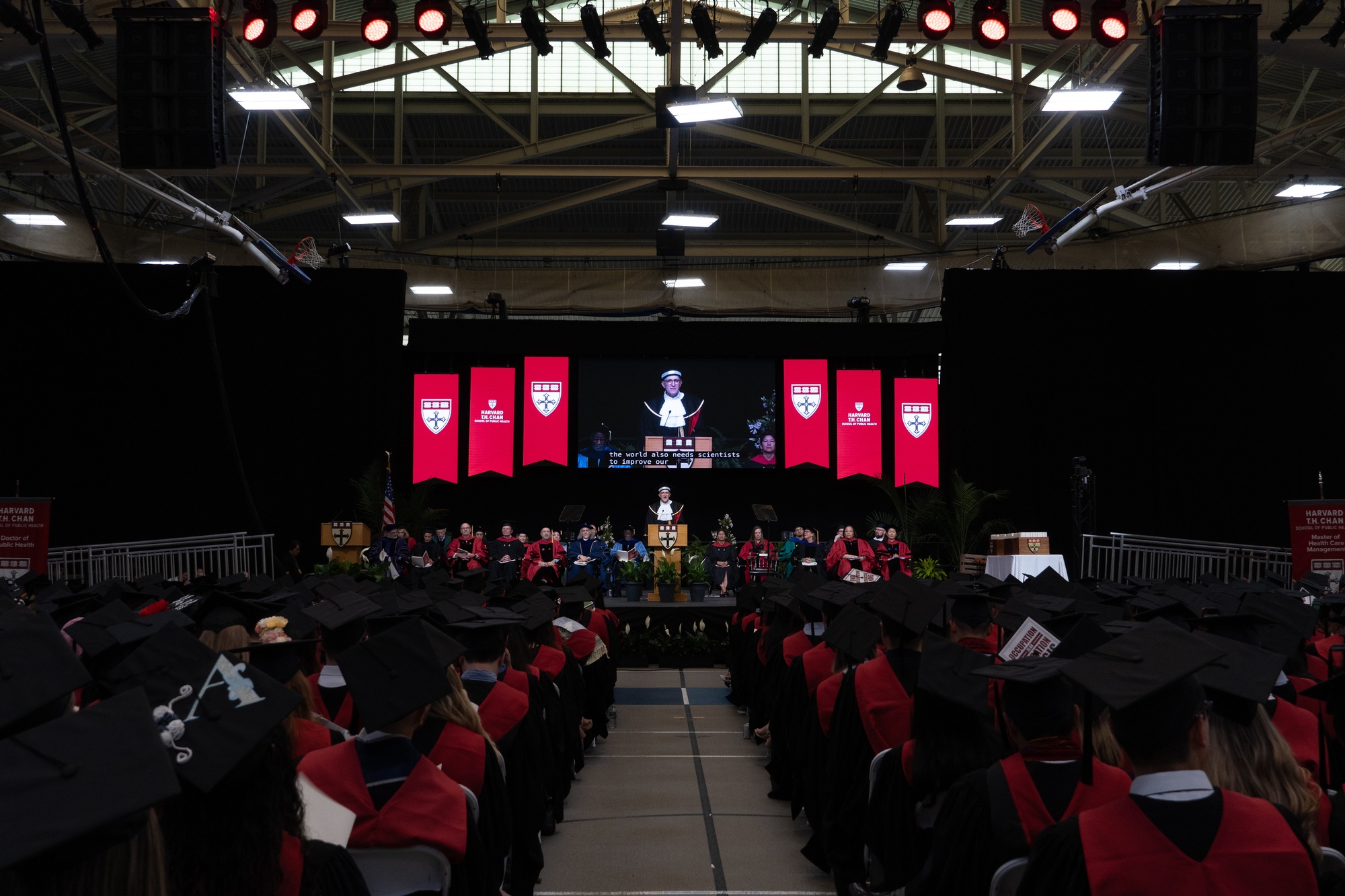A Leader for Hard Times at Longwood
Faculty say Harvard School of Public Health Andrea A. Baccarelli is a good listener and honest about the school’s dire straits — and that might be what HSPH needs.
Ever since Andrea A. Baccarelli arrived as a visiting scientist at the Harvard School of Public Health 20 years ago, he has viewed the school as a Ferrari.
“Ideas move incredibly quickly here. And they’re beautiful ideas, ideas that can make a difference in the world,” Baccarelli said during a February state of the school address. “It’s like we’re trying to drive the Ferrari on a bumpy country road.”
Like the engine of the high-speed sports car, HSPH’s research engine is strong. Harnessing its power to unleash the full potential of the institution was part of Baccarelli’s vision when he took over as HSPH dean in January 2024.
Baccarelli’s mission was one of strategic change grounded in faculty governance — summarized by what he called “AAA”: agile, accessible, and accountable.
But during his February address, Baccarelli joked that instead of a Ferrari, a more apt vehicle to describe the current state of HSPH is an SUV: less flashy, but far more able to weather harsh terrain.
Just days before, the National Institutes of Health had announced plans to slash federal funding for indirect expenses from $135 million to just $31 million, and the school had begun receiving grant terminations. Since then, the situation has only become more grim as the Trump administration continues to clamp down on universities’ access to federal research funding.
As the Harvard school most dependent on government support, HSPH has the most to lose from Trump’s attacks.
“It’s like somebody dropped a nuclear bomb on the school,” HSPH professor Sarah M. Fortune said.
Baccarelli’s transition from describing the school as a Ferrari to an SUV mirrors the evolution of his vision during the crisis. The federal funding landscape has drastically changed, and the road ahead has become far rougher. And with it, Baccarelli’s mission for HSPH has become more focused on survival.
What he originally set out to do — drive the school forward — is as relevant now as it was before. But Baccarelli’s capacity for compassion and collaboration might ultimately be what allows him to steer the school through the current storm.
‘A Commitment to Change’
Baccarelli’s deanship began in January 2024 as Harvard faced a University-wide crisis and unprecedented turnover in Massachusetts Hall. And HSPH was recovering from its own leadership crisis — Baccarelli’s predecessor, Michelle A. Williams, received a vote of no confidence from the faculty during her tenure.
Fortune likened the previous models of the school’s deanship to a “benign dictatorship,” where leaders made decisions in relative isolation and mechanisms for accountability to the faculty were ill-defined.
Rather than immediately launch into reform and strategic plans, Baccarelli began his deanship with a yearlong listening tour to better understand the school’s dynamics and inner workings. HSPH professor Lorelei A. Mucci described his approach as “gaining opinions from everybody before he forms his own.”
Baccarelli’s conversations with HSPH affiliates would eventually inspire his three-part vision — of agility, accessibility, and accountability — first announced in February 2025.
The mission’s focus on agility refers to increasing the school’s entrepreneurial work by forging research and funding collaborations with non-traditional partners for public health, such as engineers and industry CEOs. Emphasis on accessibility has taken the form of expanding the school’s non-degree programs.
A key mechanism for implementing accountability has been Baccarelli’s three working groups on finance, research, and education. Composed of faculty members, the groups have sought to decentralize decision-making and innovate in the school’s programs.
“He’s trying to create a different governance model than we have traditionally had at the school,” Fortune said.

‘Found His Moment’
Everything changed in February when the Trump administration began slashing Harvard’s federal research funding. Of all of the University’s schools, HSPH is the most vulnerable to the White House’s attacks, given that 59 percent of its operating budget comes from government and private funding.
Last week, the Trump administration froze $60 million in federal grants to Harvard in addition to more than $2.6 billion in cuts in previous weeks. Earlier this month, more than 100 Harvard researchers received termination notices for federally funded research projects. The cuts amount to a virtually unrecoverable crisis, forcing scientists to halt their often time-sensitive research.
So far, at least 139 scientists at HSPH have had federal grants or contracts terminated, according to a web page maintained by the school. Nearly all direct federal grants to scientists — at least 200 — have been canceled.
To address the funding crisis, Baccarelli has hosted five virtual town hall meetings since March with up to 1,000 attendees each, according to HSPH spokesperson Stephanie Simon. Baccarelli typically gives updates for 20 to 25 minutes — often grim news about recent funding cuts and hiring freezes — before taking questions from attendees for the remainder of the hour.
“In a different time, a listening leader would not have been so perfectly suited,” Fortune said.
“He just found his moment,” she added.
Many have attributed Baccarelli’s success in weathering the current crisis to his initial preparation.
HSPH professor Rifat Atun said that Baccarelli “really tried to understand what the issues were from the perspective of faculty and staff.”
“I think the pieces were in place when the crisis or the tsunami arrived,” he added.

HSPH professor Goodarz Danaei has been struck by how much time Baccarelli carves out for affiliates to share the challenges they are facing and potential opportunities to address them.
According to numerous faculty, Baccarelli responds to his colleagues’ questions and concerns with compassion. Adele B. Houghton, an instructor at HSPH, recalls one town hall when affiliates asked logistical questions about their visas. Baccarelli responded by speaking about his own experience acquiring a visa — something that reflected he was “really personally suffering” in seeing his colleagues and students’ struggles, Houghton said.
HSPH professor Phyllis J. Kanki echoed Houghton’s statement, saying “there’s no arrogance or anything in the way he answers slews of questions that are peppered at him in these town halls.
“I’ve never really seen something like that in a dean,” she added.
To further increase transparency and communication, Baccarelli has sent out several newsletters — titled “Notes from the SUV” — summarizing town halls, informing affiliates on recent school and University updates, and answering questions about funding.
From his letters to the town halls, Baccarelli is willing to admit uncertainty in the face of funding cuts. But faculty have praised the dean’s frank communication.
“I’d rather know the truth about what’s going on than have a false sense of hope, because then you can really plan and take action,” Mucci said.
A Fundamental Overhaul
At the moment, the school’s current funding model cannot withstand the White House’s attacks. Now, Baccarelli’s task is to fundamentally overhaul HSPH’s streams of revenue.
HSPH professor John Quackenbush said in March that with its significant reliance on government support, the school’s funding setup makes it “nominally a soft money institution.” Costs like research expenses and graduate student salaries are primarily grant-funded.
Consequently, junior faculty are particularly vulnerable. And the funding cuts will impact the trajectory of the scientific ladder as graduate and postdoctoral students face the uncertainty of paused research.
“The people that are going to suffer the most are the very young people, the new investigators, unless we can find a way to support them,” HSPH Professor Frank E. Speizer said. “It might take five to seven years to get back to where we have been, but during that period, we’ve got to find alternative sources.”

Even before the funding crisis, Baccarelli was reportedly exploring other potential funding avenues. He sought to increase the school’s footprint in its teaching and outreach to students outside of HSPH — something he pursued while a department chair at Columbia University, according to HSPH professor Francine Laden.
At Harvard, Baccarelli worked to increase non-degree programs like executive education and certificates, which are significant sources of income for the school.
Baccarelli has looked towards philanthropy as a potential option as well. The dean has worked to connect individual departments and researchers with private funding sources.
Frank B. Hu, chair of HSPH’s nutrition department, recalled a time when Baccarelli facilitated a relationship between him and a Harvard alumna Baccarelli had met at a dean’s gathering in New York City. The alumna went on to make “significant donations” to the department and women’s health research in particular, Hu said.
But the funding from this source is limited. Bacarelli told the Harvard Gazette, a University-run publication, that “it’s unrealistic to imagine it could make up for our long-standing partnership with the federal government.”
And finding donors willing to provide research funding will become increasingly competitive as other large research institutions anticipate similar funding cuts. HSPH professor Christoph Lange said that top biomedical research universities know that what happens to Harvard will “sooner or later happen to them as well, so they are pursuing kind of the same donors.”
Instead, HSPH professor Carmen Messerlian proposed the school pivot to much more expansive collaborations with industry partners — those that would expand upon the “agile” piece of Baccarelli’s vision.
“What I’m doing is what the school needs to figure out — which is how to take science and solve a real problem in the real world,” Messerlian, who founded a fertility care startup, said. “My company is funded by government. It’s funded by private sector. It’s paid for by people.”
“Those are the kinds of strategies moving forward if the school wants to actually survive,” Messerlian added.
Each decision the school makes is marked by uncertainty as news of funding cuts continues to flood in. But for the faculty, Baccarelli’s leadership is suited for the crisis.
“He’s the right dean at the moment for the school,” Lange said.
—Staff writer Claire Jiang can be reached at claire.jiang@thecrimson.com. Follow her on X at @_clairejiang_.
—Staff writer Veronica H. Paulus can be reached at veronica.paulus@thecrimson.com. Follow her on X @VeronicaHPaulus.
